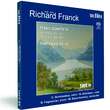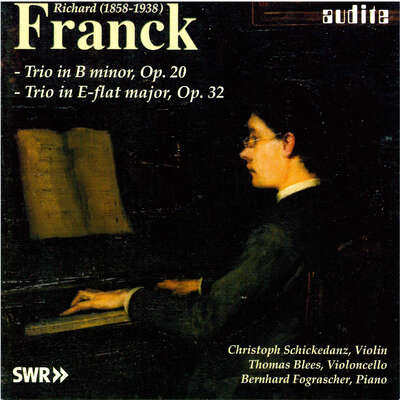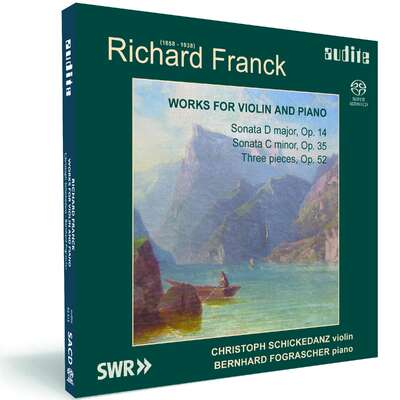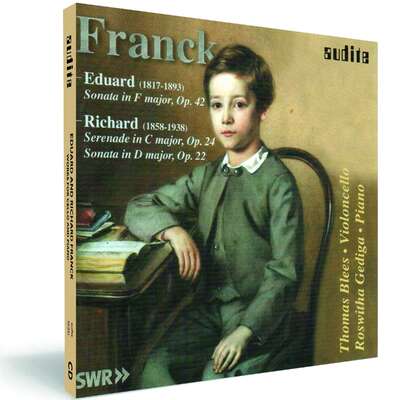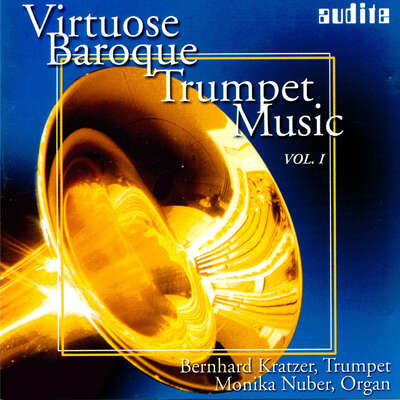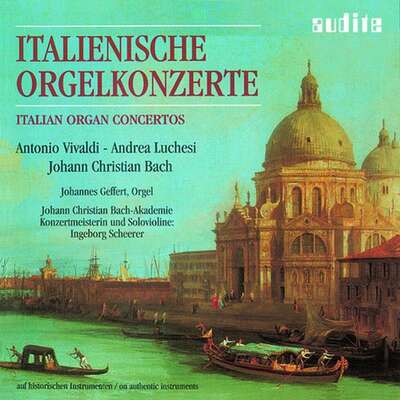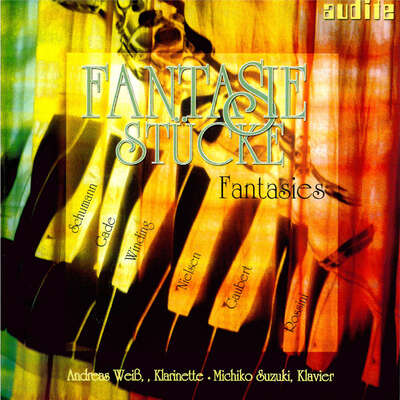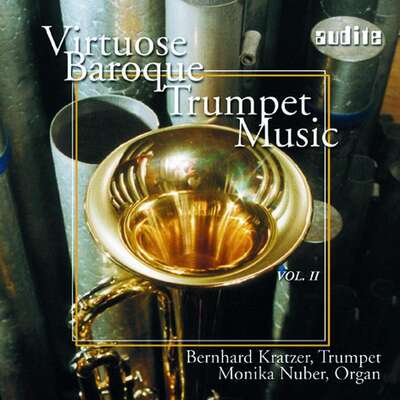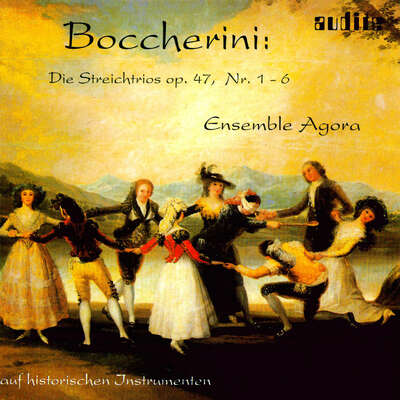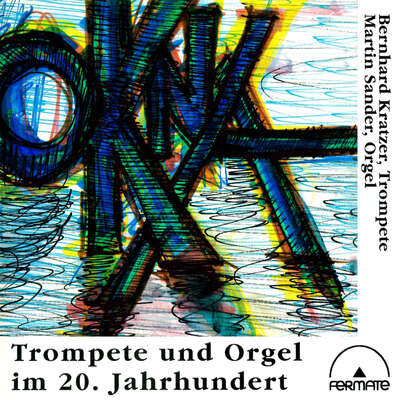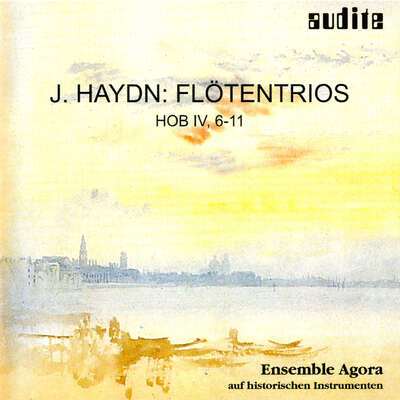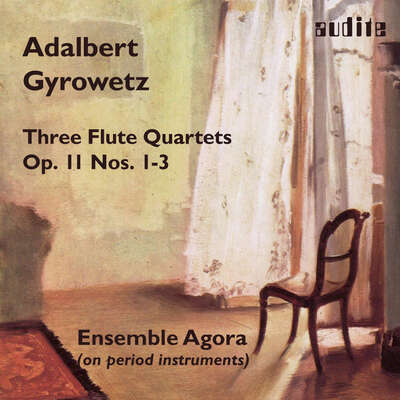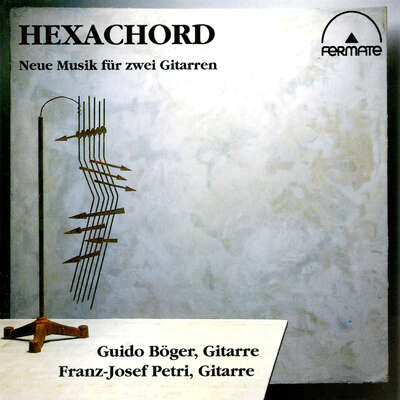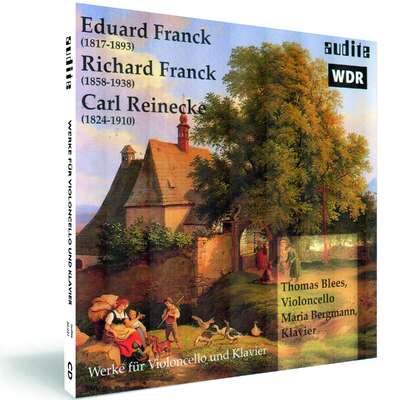
This SACD is a further addition to audite’s successful series of music by Eduard and Richard Franck – father and son . Like his father, Eduard, Richard Franck (1858-1938), one of the last representatives of late Romanticism, won a reputation as a fi ne pianist. In 1907 the Basler...more
"Performances here are excellent, with muscular virtuosity from the pianist and richly vibrant tone from all three string players, the recording ambience first class. They clearly enjoyed discovering and passing on to us these highly enjoyable works. It’s a must for those who want to explore the musical byways of the 19th and early 20th centuries." (musicweb-international.com)
Details
| Richard Franck: Piano Quartets & Fantasies | |
| article number: | 92.522 |
|---|---|
| EAN barcode: | 4022143925220 |
| price group: | ACX |
| release date: | 28. March 2007 |
| total time: | 65 min. |
Informationen
This SACD is a further addition to audite’s successful series of music by Eduard and Richard Franck – father and son. Like his father, Eduard, Richard Franck (1858-1938), one of the last representatives of late Romanticism, won a reputation as a fi ne pianist. In 1907 the Basler Nationalzeitung commented: “His outstanding quality is the art of making the piano sing; he is by turns tender and soft, warm and full of life.” But this former pupil of Reinecke also enjoyed a high reputation as a composer of chamber music and piano pieces. A contemporary reviewer in the Casseler Allgemeine Zeitung wrote in 1905: “The recital ended with the Piano Quartet in E, Op. 41 […]. Here again all the familiar qualities of Franck’s writing were in evidence: glorious melodies, unaffectedly natural harmony, rich invention and beautiful voice-leading, all combined with rhythmic verve and vitality.”
Richard Franck’s Fantasia for Pianoforte Op. 28 and the Piano Quartets Op. 33 and Op. 41 were written when Franck was at the height of his powers. The music captivates the listener with its sophisticated treatment of the musical material and the effective interaction of the four instruments. The recording pays close attention to detail while at the same time being both spacious and well-balanced.
Christoph Schickedanz (violin) and Bernhard Fograscher (piano) are already familiar from earlier recordings of music by Franck. Here this duo is expanded to include their teaching colleague from Hamburg, Marius Nichiteanu (viola) and Mathias Beyer-Karlshoj (violoncello), the cellist of the Henschel Quartet.
Reviews
www.amazon.co.uk | 10 Feb 2010 | J. A. Peacock | February 10, 2010 Two exceptional piano quartets in ideal performances and sound
Richard Franck was born in 1858, son of Eduard Franck, also a composer of distinction although neither of their names are well known now. Over theMehr lesen
If you haven't heard any of Richard Franck's music, the radiant piano quartet in A major could well be the ideal place to start. A substantial work in four movements, it contains music of rapt lyricism – the opening ‘Allegro’ is a predominantly congenial piece, its flowing opening melody suspended over a lilting rhythm in the piano; this gently dancing quality and rhythm will inform much of the consummately crafted sonata form movement that follows. It precedes an exquisite ‘adagio’, whose primary theme resonates in the mind long after the work has finished playing – harp-like accompanying figuration in the piano and pizzicato strings lends this luminous movement a decided song-like quality, one that is maintained even in the contrasting central section with its somewhat archaic sounding fugal writing. It all really is quite magical in its effect. In place of a scherzo there is a gentle allegretto in which the spirit of the ballroom is not far away. It is succeeded by an impassioned ‘allegro’ finale, the exuberance of which occasionally subsides into more romantically inclined secondary material. Of all the works I have heard by Richard Franck, I have to say that this wonderfully conceived and executed piano quartet is the one that draws me back most often.
His second piano quartet, in E major, is a strikingly contrasted work in scale and structure if not in idiom. Indeed, it occupies a similar sound world to its predecessor though there is more ardour here and, perhaps, less radiance; the soaring primary theme emerges from dark hued opening bars in the bass registers of the instruments; the contrasts of light and shade are more pronounced through the short course of this work. It is that conciseness of expression that marks this quartet out as so different to the earlier work – the whole piece lasts a mere 8'48" and is in one movement, though the tempo markings suggest that the traditional four-part series is contained within its span*: the final allegro section acts as a sort of recapitulation of the material presented at the start of the work. It was certainly well-received by the critics in Franck's lifetime, the liner notes quoting two contemporary reviews of performances – “Full of energy, temperament and refinement, the perfectly realised conception of this interesting work was communicated to us.”**
The disc concludes with three fantasies for solo piano, originally conceived independently but grouped together for publication as his opus 28. The set is headed by a quotation from Goethe and the individual pieces each bear a poetical superscription too. Franck was renowned for his mastery of the piano and his performances drew praise; it shows in these fantasies, which he performed himself in public and which contain passages fair set to trip up the unwary concert pianist. They demand sensitivity as well as technical ability if their über-Romantic sensibilities are to be given their due for none of these works are empty display-pieces. Bernhard Frograscher proves himself to be well up to the task in hand on both fronts.
He is just one of four musicians here who all deliver pretty much perfect renditions of Franck's music; throughout they display both their sensitivity to and their affection for the composer's sophisticated but always warm-hearted writing. The sound quality is equally fine, which all adds up to a winning combination.
Heartily recommended and fully deserving of the full five stars on all counts – if I could award extra stars I would.
--------
* The tempo markings are: Allegro – Adagio – Allegro – Allegro.
** Casseler Allgemeine Zeitung, 21 January 1905.
klassik.com | Juli 2008 | Christian Vitalis | July 27, 2008 | source: http://magazin.k... Richard Franck zum Dritten
Wenn in der Musik der Name Franck fällt, ist wohl meistens César FranckMehr lesen
www.clofo.com | Newsletter 17 November 2007 | Bob McQuiston | November 17, 2007
In classical music circles, when the name Franck is mentioned, most peopleMehr lesen
Scherzo | Noviembre 2007 | Emili Blasco | November 1, 2007
Richard Franck (1858-1938) es uno de esos compositores que ni tan siquieraMehr lesen
Fono Forum | August 2007 | Dr. Michael Kube | August 1, 2007 Familiär
Es ist dem Engagement der Nachfahren zu verdanken, dass Richard Franck (1858-1938) noch heute einen Platz im Musikleben einnimmt. Auch bei denMehr lesen
www.musicweb-international.com | August 2007 | Christopher Fifield | August 1, 2007
In November 2003 Musicweb posted reviews of four CDs of music Eduard Franck (see below). Since then the total recorded by Audite has increased to nineMehr lesen
The musical language of Franck Vater and Sohn, despite the change of generation and all that usually implies, remains unashamedly that of Mendelssohn and Schumann; for proof listen no further than the piano quartet in one movement with its virtually note-for-note quotation from the finale of Mendelssohn’s violin concerto in the opening and closing Allegri. Franck’s musical language consists of engagingly pleasant melodies in the context of the traditionally diatonic harmonic vocabulary he inherited via his father from those two mid-19th century composers. They are cast in the mould of Max Bruch, who also continued to write in 1920 as he had in 1865. Time stood still, the New German School headed by Liszt and Wagner was not for them, and one has to listen to and accept the works of such composers on that basis. Nonetheless Richard Franck writes well for the piano quartet combination. There is lucid clarity in the lines given to the three stringed instruments as well as powerful sonorities and rich textures in the piano writing. It is curious that, given the apparent skill and confidence he displays and which comes across when listening to his music, he did not write for string quartet (a Spanish Serenade is his only foray into that area), but on the other hand his masterly piano writing in the Three Fantasies (he was an outstanding pianist) confirms the territory occupied by that instrument as his natural habitat. Both quartets are certainly worthy of a place in the piano quartet repertory.
Performances here are excellent, with muscular virtuosity from the pianist and richly vibrant tone from all three string players, the recording ambience first class. They clearly enjoyed discovering and passing on to us these highly enjoyable works. It’s a must for those who want to explore the musical byways of the 19th and early 20th centuries.
The Strad | August 2007 | Roderic Dunnett | August 1, 2007 R. Franck Piano Quartet in A major op. 33, Piano Quartet in E major op. 41'Quartett in einem Satz', Three Fantasies for piano op. 28
This is a rich harvest. Richard Franck (1858-1938) came from aMehr lesen
Muzyka21 | 7/8 (84-85) - lipiec - sierpień 2007 | Stanisław Lubliński | July 1, 2007
Wydawnictwo Audite zafundowało melomanom kolejną niezwykłą podróż doMehr lesen
CD Compact | Julio 2007 | Esteban Ocaña Molina | July 1, 2007
No, no se confundan, hablamos en esta ocasión del compositor alemánMehr lesen
Jahrbuch – Musik in Baden-Württemberg | Jahrbuch 2007 | Georg Günther | July 1, 2007
Schon im Jahrbuch 2003 konnte eine ausgezeichnete CD mit Kammermusik des seit 1910 in Heidelberg lebenden Richard Franck (1858-1938) vorgestelltMehr lesen
Wie in den beiden hier eingespielten, 1901 bzw. 1905 entstandenen Klavierquartetten die klanglich so verschiedenen Instrumente zu einem dennoch homogen wirkenden Ensemble verschmolzen sind, dokumentiert eine hohe kompositorische Sensibilität, die – einschließlich der Verbindung von schlichter Melodik und komplexer Stimmführung – ein spannendes Hörerlebnis vermitteln. Und die Musiker lassen sich von der Qualität der Werke gleichsam »anstecken« – es ist eine lebendige, agogisch fein ausgearbeitete Interpretation, von sich der Zuhörer gerne mitreißen lässt.
In den pianistisch anspruchsvollen Fantasien op. 28, denen jeweils einige Verse aus Goethe-Gedichten als Motto vorangestellt sind, erweist sich Bernhard Fograscher als versierter Solist. Die CD stellt eine Bereicherung des Tonträgermarktes dar und wird sich hoffentlich auch auf die Gestaltung von Konzertprogrammen auswirken.
Pizzicato | 6/2007 | Rémy Franck | June 1, 2007 Lebensfrohe Kammermusik
Seit Jahren betätigt sich Audite als Promotor der Kammermusikwerke von Eduard Franck und dessen Sohn Richard. Auf der vorliegenden CD geht esMehr lesen
RBB Kulturradio | Mai 2007 | Cornelia Schönberg | May 29, 2007
Das Label audite widmet sich seit einiger Zeit den Komponisten Eduard und Richard Franck, Vater und Sohn. Beide gehören zu den Romantikern. DieseMehr lesen
Wichtige Wirkungsstätten von Richard Franck waren Basel, Kassel und Heidelberg. Er hatte zu Lebzeiten Erfolg, blieb dann aber in der Romantik verwurzelt und damit hinter den neuen musikalischen Strömungen zurück. Seine Satzkunst ist geschickt, seine Zeitgenossen schätzten an ihm die elegante Linienführung, melodische Frische und die träumerischen und stimmungsvollen Partien.
Die „Ausgrabungen“ überzeugen im Detail, nicht immer in ihrer Gesamtheit. Dabei erscheinen die Klavierfantasien wie aus einem Guss, während das bei den Klavierquartetten nicht in jedem Satz der Fall ist.
Die Musiker machen ihre Sache ordentlich und mit Engagement, vor allem Bernhard Fograscher entledigt sich seiner technisch höchst schwierigen Aufgabe sehr gut.
Diverdi Magazin | Heft Nr. 159 - Mai 2007 | Blas Matamoro | May 1, 2007
La sinceridad de Richard Franck
AUDITE recupera la obra de cámara de un romántico olvidado
Nacido en una familia de banqueros cultos, los Franck de Breslau, Richard (1858-1938) gozó con la tradición señorial de una casa vi itada porMehr lesen
Su obra recorre variedad de géneros pero el instrumento que fue su querencia ocupa en ella un lugar de privilegio, tanto solo como integrando conjuntos, tales los que aparecen en este compacto. Si hubiera que señalar una virtud decisiva en su música, habría que repetir la que hallaron en ella colegas y críticos: su sinceridad, su franqueza. Supo defenderse, por así decirlo, de las turbulencias estéticas que le tocó presenciar, cultivando una fidelidad destilada al tardío romanticismo de sus primeros años. Renunció, en cambio, a la repetición escolar y consabida de los grandes ejemplos. No faltó, como consecuencia, a su tarea, un elemento personal que se añade a la herencia del cuarteto para piano y arcos que luce en el siglo XIX (Schumann, Brahms, Dvorák, sin ir más lejos): su melodismo desenvuelto y fresco, que hace cantar, en alternancia, a los arcos y al teclado, sin alterar la estructura consabida de las obras. Aun en el llamado Cuarteto en un solo movimiento del opus 41, la forma cuatripartita, reducida y concentrada, se respeta de modo leal.
La obra de este Franck muestra cómo el talento imaginativo de un compositor puede valerse de utensilios reconocidos y heredados, sin perder por ello la libertad y la espontaneidad de sus ocurrencias.
